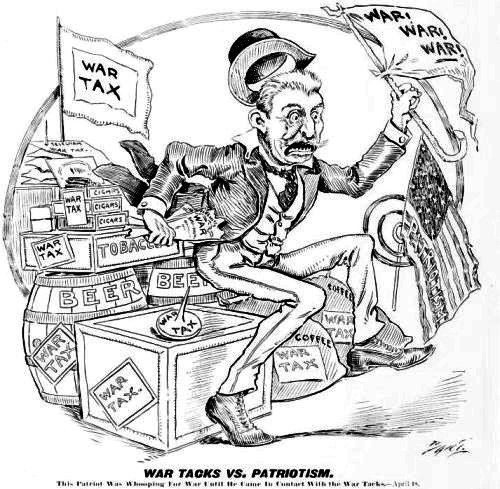I’ve covered before some of the earliest war tax resistance in America — resistance by the Quakers to being taxed to pay for the “French and Indian War”. Today, in some excerpts from The Mennonites in America by C. Henry Smith (), we get a glimpse at some of the similarly-minded resistance to war tax payment during the American Revolution:
The Mennonites during the Revolution were generally opposed to the war. It was not because, like the Tories, they favored the English crown, but because they were antagonistic to all war and rebellion as inconsistent with their religious principles.…
How they were exempted by several of the colonies in the early years of the war from active military service has been told elsewhere. This exemption was secured, however, by the payment of a money fine, or in other cases by other service such as hauling provisions, and similar work.…
These fines as well as the regular war taxes were not always paid willingly nor without some attempt to evade them. The question of war taxes led, as we shall see, to dissention among some of the congregations of the Franconia conference district. Being a nonresistant people, many of them, like the Quakers, felt that to pay a fine or special tax for the support of war was as inconsistent with their religious principles as to enlist in the army for actual service. How general this view was among the Mennonites it is difficult to say, but Christian Funk, writing of the conditions at this time says,
The majority of the ministers in the western part of Montgomery county were opposed to the payment of a new war tax of three pounds, and ten shillings which had been levied in .
…Funk contended that the tax ought to be paid and said, “Were Christ here he would say give Congress that which belongs to Congress and to God what is God’s.” Andrew Ziegler, the spokesman for the opposite party, replied, “I would as soon go to war as pay the three pounds and ten shillings.”
Funk was excommunicated in for paying the war tax, whereupon he started up a splinter branch of the sect, known as “Funkites,” which lasted until it was torn apart in another schism by about .
In Maryland there were comparatively few Menonites before the Revolution. Their influence was much less than that of their Pennsylvania brethren and thus they met less opposition to their demands. But here, too, they had to resort to petition for all the exemptions they enjoyed. The petition for freedom from military service is not to be found anywhere in the published records, but a resolution recorded in the minutes of the Constitutional Convention of shows us what its contents must have been. Under date of , the following entry occurs in the Journal on the reading of the petition of the “Society of Mennonites and German Baptists:”
Resolved that the several committees of observation may at their discretion prolong the time or take security for the payment of any fine by them imposed for not enrolling in the militia and may remit the whole or any part of the fines by them assessed and it is recommended to the committees to pay particular attention and to make a difference between such persons as may refuse from religious principles or other motives.
I hope to have some time to read more, as the book also shows that occasionally the government would either waive the fines or extra taxes applied to conscientious objectors, or would write the laws to say that such fines and taxes would be applied to pay for the care of the wounded or to other humanitarian concerns (much in the fashion of the “Religious Freedom Peace Tax Fund Act” and other such schemes).


